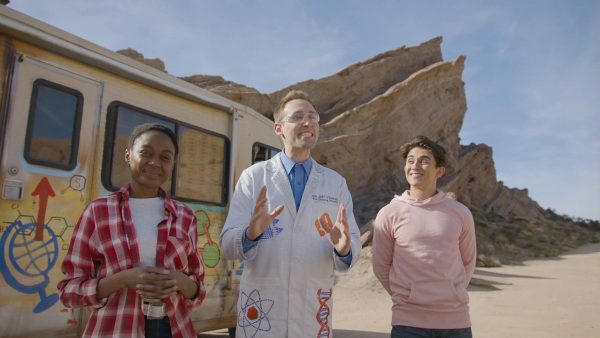Seismologist Definition
A seismologist is a scientist who studies earthquakes. For example, they study plate tectonics.
View Lesson on Tectonic Plates
Become a member to get full access to our entire library of learning videos, reading material, quiz games, simple DIY activities & more.
Become a member to get full access to our entire library of learning videos, quiz games, & more.
Plans & Pricingto watch this full video.

Access All Videos
and Lessons, No Limits.
Access All Videos

No credit card required,
takes 7 sec to signup.
No card required

Ready-to-go lessons
that save you time.
Ready-to-go lessons
If you are on a school computer or network, ask your tech person to whitelist these URLs:
*.wistia.com, fast.wistia.com, fast.wistia.net, embedwistia-a.akamaihd.net
Sometimes a simple refresh solves this issue. If you need further help, contact us.
Tectonic Plates
Fun Facts
- Seismologists study patterns of earthquakes to predict where more earthquakes could strike.
- Seismologists use seismographs to report data about earthquakes.
- Seismologists analyze earthquake patterns, sizes, locations, and depths.
Why Do We Need To Know About Seismologist
Seismologists help us understand earthquakes better, which is important for keeping us safe. Every year, there are over 20,000 earthquakes around the world. Seismologists study these earthquakes by looking at how big they are, where they happen, and how deep they are using a tool called a seismograph. This helps them predict big earthquakes and reduce the damage they can cause.
This knowledge is important for keeping people safe because it helps send out early warnings and helps understand where earthquakes might happen. Seismologists also work with other scientists like volcanologists and geologists. This teamwork helps us learn more about volcanoes, the Earth’s history, and how to save lives and understand our planet better.
Frequently Asked Questions
Check out the Full Lesson on Tectonic Plates
In this lesson, we learn that:
- The Earth's surface is cracked into large pieces called tectonic plates.
- Tectonic plates slowly move, creating mountains, islands and even re-arranging continents.
- Scientists can track the history of the plate movements by analyzing fossils and rock layers.
Related Topics
- Amplitude Definition
- Analog Signal Definition
- Atom Definition
- Binary Code Definition
- Camouflage Definition
- Continental Drift Definition
- Convergent Boundary Definition
- Corona Definition
- Definition Of Engineering
- Definition Of Human Body Systems
- Divergent Boundary Definition
- Earth’s Axis Definition
- Electron Definition
- Energy Definition
- Fresh Water Definition
- Geologic Processes Definition
- Igneous Rock Definition
- Light Source Definition
- Limited Resource Definition
- Magma Definition
- Magnetic Poles Definition
- Magnetism Definition
- Marsupial Definition
- Mineral Definition
- Natural Disaster Definition
- Natural Selection Definition
- Non-renewable Energy Definition
- Opaque Definition
- Partial Eclipse Definition
- Prey Definition
- Respiratory System Definition
- Seeing Definition
- Seismologist Definition
- Senses Definition
- Signal Definition
- Smelling Definition
- Snow Definition
- Soil Erosion Definition
- Solubility Definition
- Tectonic Plates Definition
- Temperature Definition
- Thermal Energy Definition
- Tissue Definition
- Transform Boundary Definition
- Vibrating Definition
- Volcano Definition
- Water Erosion Definition
- Weathering Definition
Start a Free Trial Today. Get a $5 Amazon Gift Card!
Teachers! Start a free trial & we'll send your gift card within 1 day. Only cards left. Try it now.
Select Grade
Select Subject
This email is associated with a Science Kit subscription. Kit subscriptions are managed on this separate page: Manage Subscription

-
Download InvoiceScience & Math$/yr
-
Download InvoiceScience Only$/yr

access all lessons
• No credit card required •
"My students loved the videos. I started the video subscription in May and used them as a review before the state test, which I know contributed to 100% of my class passing the state test."
Rhonda Fox 4th Grade Teacher, Ocala, Florida
Use Generation Genius in Your School
Access all lessons free for 30 days.
"My students loved the videos. I started the video subscription in May and used them as a review before the state test, which I know contributed to 100% of my class passing the state test."
Rhonda Fox 4th Grade Teacher, Ocala, Florida
• No credit card required •
Already a member? Sign In
* no credit card required *

* no credit card required *
* no credit card required *


to Discover the Benefits of Generation Genius
Learn How to Save for Your School & District!

no credit card required
Skip, I will use a 3 day free trial
Enjoy your free 30 days trial
-
Unlimited access to our full library
of videos & lessons for grades K-5. -
You won’t be billed unless you keep your
account open past your 14-day free trial. -
You can cancel anytime in 1 click on the
manage account page or by emailing us.
-
Unlimited access to our full library of videos & lessons for grades K-5.
-
You won't be billed unless you keep your account open past 14 days.
-
You can cancel anytime in 1-click on the manage account page.
Cancel anytime in 1-click on the manage account page before the trial ends and you won't be charged.
Otherwise you will pay just $10 CAD/month for the service as long as your account is open.
Cancel anytime on the manage account page in 1-click and you won't be charged.
Otherwise you will pay $10 CAD/month for the service as long as your account is open.
We just sent you a confirmation email. Enjoy!
DoneWe use cookies to make your experience with this site better. By using this site you agree to our use of cookies. Click "Decline" to delete and block any non-essential cookies for this site on this specific property, device, and browser. Please read our privacy policy for more information on the cookies we use.Learn More
We use cookies to improve your experience. By using this site, you agree to our use of cookies. Click "Decline" to block non-essential cookies. See our privacy policy for details.Learn More




























































































































